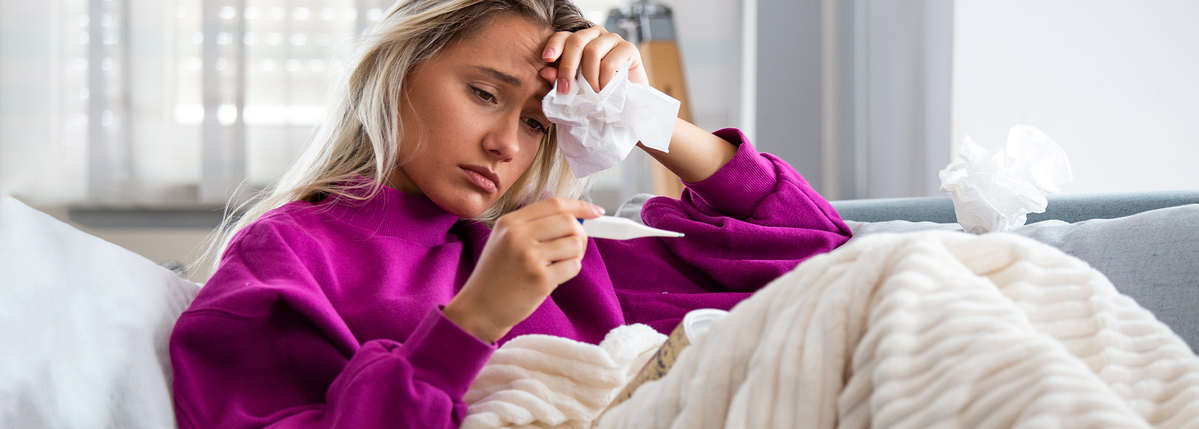Back To College: Sick Days with Type 1 Diabetes
Editor’s Note: For more information on managing type 1 diabetes in college, sign up for Beyond Type 1: College Edition, our email series on all things college + T1D.
It is almost inevitable for college freshmen to catch a common cold, the flu or a stomach bug. Getting sick can wreak havoc on your diabetes management by causing fluctuations in your blood sugar levels. When toppling the sickness with exams, classes and assignments, it can be pretty overwhelming and daunting to reach out for guidance. But with proper preparation, battling through sick days in college while living with diabetes is not impossible!
Here are some tips on how to prepare for sick days as a college student living with type 1 diabetes (T1D).
First, don’t forget your mental health
Your emotional health matters, too! Whether you’re dealing with a stomach bug or you’re perfectly healthy, mental health challenges like anxiety and depression are common. When you add T1D to the mix, it’s extra important that you reach out for help when you need it.
- Remember, your family and friends want to help when you’re struggling with a physical or mental health challenge. You are not a burden. Let them help you.
- Talk to your healthcare team if constantly checking medical devices or your diabetes management becomes too stressful.
- Reach out to the mental health counselors available at your college. This is usually free and included as part of your tuition.
- Find a community—like The Diabetes Link (a community for teens and twenty-somethings with diabetes, formerly known as the College Diabetes Network) and see if your campus has a chapter!
- Call 988 for the National Mental Health hotline if you need help and don’t know where to turn. It’s a hotline for mental health help, open 24/7 and completely free.
Your mental health matters! As a person with T1D, you have even more stress on your daily plate than the average student. There are resources and support available to you!
Tips to Manage Your Physical Health in College
The stress, social pressure, partying and lack of sleep you may experience during college can impact your physical health just as much as sickness does. With diabetes in the mix, it can be a serious struggle. Cold and flu symptoms may make you feel tired and weak, similar to feelings of hypoglycemia or hyperglycemia.
Here are some tips on sick day preparedness and how to take the best care of your physical health with T1D in college!
Tip #1: Watch your blood glucose + ketones closely
If you use a continuous glucose monitor (CGM), use the trend arrows associated with your blood glucose level readings to be ready for any highs or lows. Blood glucose levels can change rapidly during sickness because more stress hormones are activated. When your blood glucose is higher than 13.9 mmol/L250 mg/dl, make sure to test for ketones.
Tip #2: Have an emergency glucagon pen
If you are vomiting from your sickness, it can be difficult to manage hypoglycemic events if you can’t keep anything down. Being able to inject glucagon when there’s more insulin in your system than needed can be living-saving!
Tip #3: Don’t wait to go to the ER
If you are continuously vomiting or developing high levels of ketones, you need to go to the emergency room. Do not wait to see if it gets better. If you are unable to take yourself to the ER, you can call your university’s safety police and they can help coordinate getting you an ambulance. Before you absolutely need it, get to know your university’s safety police procedures for emergencies and have their number saved on your phone.
Tip #4: Prevent sickness by establishing a healthy routine
The college lifestyles can consist of cycles of late nights of studying or socializing. Not easy for managing type 1 diabetes. The more you practice healthy routines like moderating alcohol and high-carb foods, the more easily you’ll be able to manage your T1D and overall health to prevent getting sick. Getting vaccinated against the flu and COVID will also help protect you against severe illness. Getting enough sleep is important too!
Tip #5: Communicate clearly with your professors if you’re missing class due to managing an illness or T1D-related issues
When sick, you may need to retake a test, get an extension for an assignment, or miss several classes. Good communication with your professors is key! Professors can provide extensions on exams and assignments for excused absences, such as sickness.
Tip #6: Keep in touch with your healthcare team
It is important to feel comfortable and have open discussions with your healthcare team. Discuss potentially changing carb and bolus ratios or how often you should be testing your blood glucose levels when sick. Communicate with your healthcare team to make sure your prescriptions are up-to-date. Keep your medications and supplies stocked for sick days.
Tip #7: Have a commuter’s plan of action
If you are sick, do not commute to campus. Taking care of your health is more important. Notify professors if you are unable to commute to campus so they can accommodate you. If you live off-campus alone, make sure to reach out to family or friends for help. Just like students who live on-campus, commuters should also make sure they have supplies stocked at home for sick days.
Tip #8: Wear medical alert jewelry
You’re in a whole new place filled with people who don’t know you that well. Your medical alert jewelry will inform the emergency responders that you have T1D, which can be life-saving! Make sure your medical alert jewelry includes emergency contact information.
Tip #9: Use school accommodations and resources
Students with T1D are protected from disability discrimination under the 504 plan. These accommodations stress the importance of taking care of yourself before your academic duties. You can receive extensions on assignments, bring food and drink into classrooms, take exams with extended time and be excused from class due to medical appointments.
These are just a few tips to help you prepare for future sick days while managing your diabetes and being in college. Don’t forget there are other resources that can help you come up with a sick day plan and support you during sickness, like The Diabetes Link (formerly College Diabetes Network), your college or university’s health services and public safety/safety police.





